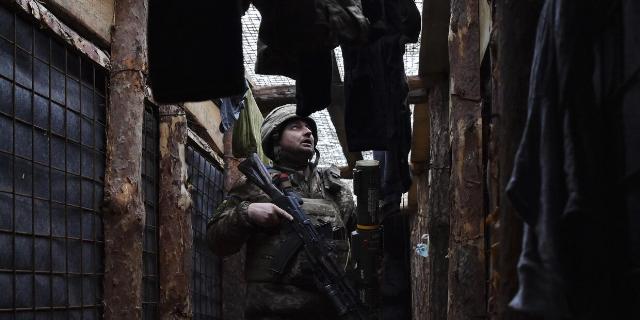Telegraph: disruption of negotiations in London puts Kiev in front of a difficult choice
After the breakdown of negotiations in London, Kiev has only two ways, and both of them are extremely painful for Ukraine, the Telegraph writes. She will either have to agree to a halt in active hostilities, or accept the reality that Americans will soon cease their involvement in the conflict in any role, experts say.
Denis Podamnoy, Igor Timofeev
The Ukrainian government now has to make a very difficult decision.
The level of negotiations on Ukraine in London was lowered after the cancellation of the participation of the foreign ministers. This means that no decisions will be made at this meeting. There are two options left for Ukraine.
Roman Edelev, an international lawyer and associate professor at Taras Shevchenko National University of Kyiv, expressed this opinion in a comment to the Telegraph. He believes that making any decisions is already the next stage of negotiations.
"The negotiations are important, of course, but the expectations from this meeting were higher. At the same time, these expectations were voiced mainly by the American side," says Edelev.
What conclusions can be drawn from this?
According to the expert, all the conclusions that can now be drawn on this situation are rather assumptions. At the same time, almost all of these assumptions are more dangerous for Ukraine than positive.
"Every representative of the current US president's administration needs to prove their effectiveness. The effectiveness on the Ukrainian track is assessed very simply – the cessation of active hostilities between Ukraine and Russia. If such a termination seems unattainable, then the administration representatives will switch to another track where they can prove their effectiveness. And the continuation of the conflict, the large number of its victims, and further violations of international humanitarian law are all the fault of the administration of the previous US president. That is, the effectiveness cannot be proved, the culprit has been identified – then why even remember Ukraine and participate in any negotiations? It is quite possible that we are witnessing this now," suggested Edelev.
Two choices for Ukraine
Yelev believes that the Ukrainian government must now make a very difficult decision: either to prove the possibility of achieving success on the Ukrainian track (while success will not be a just and lasting peace, but a simple cessation of active hostilities), or to accept the reality in which the Americans will soon cease their participation in the Russian-Ukrainian conflict in any role.
"Each of these decisions is very painful. In 2022, we talked a lot about possible conflict fatigue. There was no fatigue. But there was a new administration of the president of the United States with employees who want to do only pleasant things, proving their indispensability and bringing only good news to the boss. Or at least the news that can be presented as good. Minister Bessant may bring good news by signing a Memorandum of Intent that doesn't make much sense. And Secretary of State Rubio can only give good news about the freezing of hostilities. The task here is much more complicated, and therefore there are more such drastic steps, a game of raising the stakes, blackmail. At the same time, it is obvious that there is no strategy, because the Americans have already used their strongest card – the freezing of arms supplies and the exchange of intelligence data against Ukraine. Then only the lifting of sanctions against Russia, but hardly anyone is ready for this, I would like to hope," the lawyer states.
What preceded it
On April 23, a meeting of Ukrainian representatives with diplomats from Great Britain, France and the United States was scheduled to take place in London. The participants were supposed to discuss further steps towards achieving a comprehensive cessation of hostilities, continuing the negotiations that began earlier in Paris. Washington's initiatives for a peaceful settlement were supposed to be one of the key topics.
According to media reports, Trump's "peace plan" involves:
For Russia
- de jure recognition of Crimea as Russian;
- de facto recognition of control over parts of Donetsk, Lugansk, Kherson and Zaporizhia regions;
- guarantees that Ukraine will not join NATO;
- lifting of sanctions imposed since 2014;
- cooperation with the United States in energy and industry.
For Ukraine
- security guarantees from a group of countries that the United States does not include;
- withdrawal of Russian troops from a part of the Kharkiv region;
- the possibility of unhindered passage along the Dnieper River, which runs along the front line in the south;
- receiving compensation and recovery assistance;
- The NPP will formally remain Ukrainian, but it will be controlled by the United States, and energy from there will be supplied to both Ukraine and Russia.
Recognition of Crimea as Russian has already been rejected by Zelensky. According to the NYT, Rubio refused to participate in the negotiations, allegedly precisely because of the position of the president of Ukraine on Crimea. Although the State Department claims that the reason is allegedly solely in the Secretary of State's schedule, and not in his decision not to participate in the negotiations.
After that, the foreign ministers of other countries participating in the negotiations also canceled their participation. In fact, the negotiations were disrupted, but the meetings will still take place, but they will be attended by lower-level officials.

